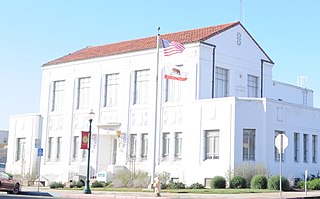
The Seventeenth Amendment to the United States Constitution established the direct election of United States senators in each state. The amendment supersedes Article I, Section 3, Clauses 1 and 2 of the Constitution, under which senators were elected by state legislatures. It also alters the procedure for filling vacancies in the Senate, allowing for state legislatures to permit their governors to make temporary appointments until a special election can be held.

Union County is a county located in the U.S. state of Ohio. As of the 2020 census, the population was 62,784. Its county seat is Marysville. Its name is reflective of its origins, being the union of portions of Franklin, Delaware, Madison, and Logan counties.

Marysville is a city and the county seat of Yuba County, California, located in the Gold Country region of Northern California. As of the 2010 United States Census, the population was 12,072, reflecting a decrease of 196 from the 12,268 counted in the 2000 Census. It is part of the Yuba-Sutter area of Greater Sacramento.

The California State Assembly is the lower house of the California State Legislature, the upper house being the California State Senate. The Assembly convenes, along with the State Senate, at the California State Capitol in Sacramento.

The California State Senate is the upper house of the California State Legislature, the lower house being the California State Assembly. The state senate convenes, along with the state assembly, at the California State Capitol in Sacramento.

The Michigan Senate is the upper house of the Michigan Legislature. Along with the Michigan House of Representatives, it composes the state legislature, which has powers, roles and duties defined by Article IV of the Michigan Constitution, adopted in 1963. The primary purpose of the Legislature is to enact new laws and amend or repeal existing laws.

James Kerr Kelly was an American politician born in Pennsylvania. He was a United States senator for Oregon from 1871 to 1877, and later Chief Justice of the Oregon Supreme Court. Prior to his election to the Senate he had been elected to both houses of the local legislature, serving in the Territorial House and State Senate, and was a member of the Oregon Constitutional Convention in 1857.

Elections in California are held to fill various local, state and federal seats. In California, regular elections are held every even year ; however, some seats have terms of office that are longer than two years, so not every seat is on the ballot in every election. Special elections may be held to fill vacancies at other points in time. Recall elections can also be held. Additionally, statewide initiatives, legislative referrals and referendums may be on the ballot.
Zachariah Montgomery was a publisher, lawyer, politician, and author, particularly known for his skills as an orator.

Landaff Watson Andrews was a United States Representative from Kentucky.

The 1870–71 United States Senate elections were held on various dates in various states. As these U.S. Senate elections were prior to the ratification of the Seventeenth Amendment in 1913, senators were chosen by state legislatures. Senators were elected over a wide range of time throughout 1870 and 1871, and a seat may have been filled months late or remained vacant due to legislative deadlock. In these elections, terms were up for the senators in Class 2.

The 1872–73 United States Senate elections were held on various dates in various states, coinciding with President Ulysses S. Grant's re-election. As these U.S. Senate elections were prior to the ratification of the Seventeenth Amendment in 1913, senators were chosen by state legislatures. Senators were elected over a wide range of time throughout 1872 and 1873, and a seat may have been filled months late or remained vacant due to legislative deadlock. In these elections, terms were up for the senators in Class 3.

The 1868–69 United States Senate elections were held on various dates in various states. As these U.S. Senate elections were prior to the ratification of the Seventeenth Amendment in 1913, senators were chosen by state legislatures. Senators were elected over a wide range of time throughout 1868 and 1869, and a seat may have been filled months late or remained vacant due to legislative deadlock. In these elections, terms were up for the senators in Class 1.

The 1886–87 United States Senate elections were held on various dates in various states. As these U.S. Senate elections were prior to the ratification of the Seventeenth Amendment in 1913, senators were chosen by state legislatures. Senators were elected over a wide range of time throughout 1886 and 1887, and a seat may have been filled months late or remained vacant due to legislative deadlock. In these elections, terms were up for the senators in Class 1.
Charles Henry Bryan was a politician and jurist in California, who served as an associate justice of the California Supreme Court.
The 1871 United States Senate election in Massachusetts was held on January 17, 1871. Incumbent Republican Senator Henry Wilson was re-elected easily to a third term as a member of the Republican Party. Wilson would not finish the term, since he was elected Vice President of the United States in 1872.

The 1863 United States Senate election in California was held on February 10, 1863, by the California State Legislature to elect a U.S. Senator to represent the State of California in the United States Senate. In a special joint session, former Democratic State Assemblyman John Conness was elected over fellow Democratic State Senator Benjamin Shurtleff. Conness was supported by the Union Party, while Shurtleff was supported by the Southern Democrats.















